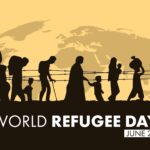The Rainbow Initiative, a program of Episcopal Migration Ministries (EMM), focuses on supporting LGBTQ+ individuals who have fled their home countries seeking safety. With a network of 28 Rainbow Initiative Congregations and Communities (RICs) across the United States and Europe, EMM aims to create a welcoming environment for LGBTQ+ newcomers and provide them with visibility and direct aid. In this blog post, Max Niedzwiecki, a leadership consultant for EMM, explores the connection between refugee support and LGBTQ+ advocacy. By highlighting the significance of Pride and World Refugee Day events, this post emphasizes the importance of participating in these events alongside LGBTQ+ newcomers. This post also features insights from individuals who have taken this step and provides a collection of resources that service providers and their agencies can customize to raise awareness of LGBTQ+ newcomers at public events.

Amid the global refugee crisis, it is crucial to recognize that a significant portion of those seeking safety and asylum also face the additional challenges of being LGBTQ+. The U.S. government, UNHCR, and other organizations have long acknowledged the unique protection needs of LGBTQ+ refugees. Every community, including newcomer communities, encompasses LGBTQ+ individuals.
Despite this recognition, sexual orientation and gender identity are often overlooked when assisting newcomers. This oversight is not limited to those working directly with refugees; even those advocating for LGBTQ+ equality may sometimes miss the immigration aspects of their work.
Not every agency will be ready to publicly proclaim a robust welcome for LGBTQ+ newcomers right away. Some may need more time to prepare logistically or to build partnerships. Others may want to first pursue a higher level of internal consensus or deepen their staff’s knowledge base. Switchboard and its partners have prepared training modules to help you move along that path in ways that fit your unique needs, and they are in the process of creating more.
Pride and World Refugee Day
Hundreds of communities across the U.S. hold Pride events, often in June, including parades, festivals, picnics, religious services, forums, and other activities. Many LGBTQ+ individuals choose to participate in Pride events as a means of openly expressing their sexual orientation or gender identity in a supportive and celebratory environment. Other participants come to show support for their LGBTQ+ family, friends, neighbors, clients, and customers.
Pride originated as activism in response to violence and oppression. Since 1998, several U.S. presidents have marked Pride Month through proclamations and public events. Despite the high-level support and increasing diversity, newcomers continue to be largely invisible during Pride events.
In addition to celebrating Pride, some resettlement agencies have begun to draw attention to LGBTQ+ newcomers on World Refugee Day, celebrated every year on June 20th, including Church World Service, the Ethiopian Community Development Council, Episcopal Migration Ministries, HIAS, and the International Rescue Committee Some LGBTQ+ organizations like the Human Rights Campaign—as well as those that specifically focus on immigration like InReach, the Organization for Refuge, Asylum & Migration, and Rainbow Railroad—have also begun to shine a spotlight on World Refugee Day.
There are many benefits to continuing and expanding these practices, including:
- Building goodwill in the community: Your agency needs a continuous flow of human and financial resources to fulfill its mission. By supporting LGBTQ+ communities in a visible way, you open up your agency to new potential sources of support.
- Forming partnerships: Developing relationships with LGBTQ+ organizations can provide newcomer clients with integration opportunities and specialized legal, medical, or other support.
- Normalizing LGBTQ+ concerns: There is much to learn whenever you begin to work with a new community. The community’s norms about ways of thinking, acting, and speaking may seem unfamiliar and be hard for staff to adjust to. By beginning to address LGBTQ+ issues at Pride and World Refugee Day events, you can start to overcome these barriers so that you’ll be able to more effectively meet the needs of LGBTQ+ clients.
- Demonstrating your welcome and affirmation: Many LGBTQ+ newcomers have learned that it is safer for them to be “closeted,” or to hide their sexual orientation or gender identity. It can be especially important for such clients to see themselves welcomed by the agencies that are working to help them. You can stand up for them when they are not able to stand up for themselves, and your affirmation could be tremendously important to them.

Ideas for LGBTQ+ Newcomer Events
Recognizing LGBTQ+ newcomers during Pride Month and World Refugee Day events can seem like a major endeavor, but it doesn’t need to be. Several resettlement providers and volunteers who work to support newcomers have shared their tips and experiences with running these events, offering practical ideas for how to get involved:
- Display rainbow flags on your building, walls, desks, and lapels. As Beth Holst of First Lutheran Church in Duluth, MN, noted, “People in the crowd appeared to really read the banner as we marched by, and lots of people gave us a shout-out or thumbs-up sign for it. We were affirmed in our work and broadened the circle. We also better connected with the general support group for LGBTQ+ people in our area.”
- Create or simply share posts on your social media and blogs. Noah McBrayer Jones with Bridge Refugee Services of Knoxville and Chattanooga, TN, emphasized, “This was an important opportunity for us to stand alongside our LGBTQ+ friends. We were also able to connect to like-minded individuals who were not aware that our agency supported the community.”
- Schedule a brown-bag educational event for staff or volunteers using, for example, resources available from Switchboard like the recording of the recent webinar titled Understanding and Serving LGBTQ+ Newcomers, the evidence summary What Works to Support LGBTQ Refugees?, the podcast Serving LGBTQ+ Newcomers, and several other modules due to be released during the summer of 2024. This can help foster a better understanding of the unique challenges faced by LGBTQ+ newcomers, as Noah McBrayer Jones in Tennessee recognized: “We are asking our clients to make their new homes in a new community. We’ve found that when we approach that scenario in recognition of their authentic selves, we have a better framework to help them rebuild.”
- Stage a public event like a community forum. Beth Ilem of St. Michael & All Angels Episcopal Church in Portland, OR, shared that their group “invited a person who was forced to flee his homeland because of his sexual orientation to speak at an adult education forum. It was well attended and received. It was valuable to hear someone’s story in their words.”

- Set up a table at a Pride festival with information about your agency and LGBTQ+ newcomers. Karen Nolan of Epiphany Episcopal Church in Vacaville, CA, found this to be “a good bonding experience for our volunteers” while also helping to raise awareness about the special needs of LGBTQ+ newcomers. They noted, “While we hear about people being persecuted in far off countries for being LGBTQ+, I don’t think everyone makes the connection that some of those folks are actually coming here as refugees or asylum seekers.”
- March with signs and banners in a Pride parade. This can be a powerful way to show support and connect with the broader LGBTQ+ community, as experienced by Beth Holst in Minnesota: “We got lots of thumbs-up and smiles from the crowd!”
- Develop and distribute a flyer about LGBTQ+ newcomers at a World Refugee Day event. This can help educate the public about the intersection of LGBTQ+ rights and refugee issues.
Event-Day Resources
It’s important to think about safety at all public events, particularly when emotions are running high. Many local organizing committees for Pride events post guidance online. The National Coalition of Anti-Violence Programs also offers information and online training programs.
We’ve developed the following graphic design files that you can customize for your own use:










